Two reflective thoughts on Christian leadership (based on studying 2 Chronicles for a sermon series)7/28/2017 Over the past few months I have been studying through 2 Chronicles for a current sermon series on this part of Israel's history and how it applies to our CPC in The Hill congregation. Here are two thoughts--my former Prairie Bible College students would have called them "Chip's stream of consciousness."  Reflecting on the events and personalities in 2 Chronicles 10-12 has lead me to consider the problem of leadership--once again. I contend the spiritually mature is reluctant to take up the mantle of leadership, for she or he knows that stepping into such a role will challenge his or her own humanity and will face the massive temptation to deny, redefine, or hinder the humanity of others. The truly spiritually mature is hesitant in taking a leadership status for there will be great temptation to enjoy, and then to crave, the idolatrous power that so naturally attaches to and is granted to leaders. The platform for Christian leadership is fraught with danger, idolatrous infirmities, and is a dark place, full of terrors (as a Game of Throne's character would say about the night).  Seems many believe that the goal of the strong (well at least those who consider themselves strong) is to help critique and then change the weak into the strong; whereas, the way of God in this world (as far as I can see in the Scriptures) completely turns our cultural attitude about strength (i.e., the strong) and the contempt for weakness (i.e., the weak) on its head, that is, the strong (who are only so by God’s grace and nothing in and of themselves) are to carrier, advocate for, and serve the weaker. Those privileged with some measure and gift (for all things are given, there is nothing that hasn't been received as gift, cf. 1 Corinthians 4:7) of strength (be it wealth, health, physical strength, clarity of mind, talent, or even the immediate amenities needed or desired for life), you have the gift in order to expend it on others, especially those who are weak (be it the lack of wealth, health, physical strength, clarity of mind, talent, or even the immediate amenities needed for life). This is the way and mind of the One we are called to follow, the One who had it all and left it all to become a servant, even a servant to the point of death on a cross (e.g., Philippians 2:5-11). *A side note, since I am also studying 1 Corinthians as well: It is interesting to note this also seems to be the issue at the table in 1 Corinthians 10-14.
0 Comments
Wasted Quote: "God uncredentialed in the empire, unknown in the courts, unwelcome in the temple"7/22/2017
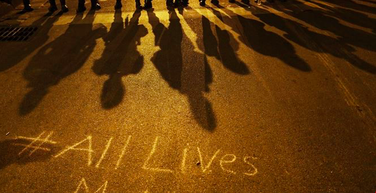 When we hear “All Lives Matter" or “Black Lives Matter," no matter who is hearing the phrase, we tend to hear it politically first, with a whole set of pre-answered assumptions about history, culture, and race, and, as well, with suspicion of some assumed social and/or political agenda behind it. We agree (cheer) or disagree (counter) depending on our own agenda, what we fear, or what we feel the need to protect (or maybe exploit). I get this. It is interesting when Jesus likened the first command to love God with all we got and have, he, then, didn't say, “and love everyone because all lives matter.” No. He was actually very specific, “Love your neighbor.” Of course, we know he didn't just mean the one living next door. Yet saying “neighbor” gave the command a specific definition, even a demographic, and yes, an assumed religious view, which, then, forced everyone to focus on “who is my neighbor?” See—upon hearing the command, it became even more specific. I believe we, that is, Christians, need to reconsider why the hashtag “Black Lives Matter” actually matters (lay aside the political organization here, BLM, and think of actual people) and that we, particularly as Christians, should embrace it. Herein is the issue—for the Christian. You see, the seemingly all-inclusive phrase “All Lives” is not necessarily, well, all inclusive anyway. “All Lives” is predicated on what one means by “Lives” and who fits within its perimeters. In early America, if the framers were to have used “All Lives Matter” instead of “all men,” you can (or should be able to) see why this matters.
Some, in arguing for and defending “All Lives Matter” over against “Black Lives Matter,” make reference that our Declaration of Independence states “all men are created equal.” Although “all” probably referenced “more than just royalty (i.e., the English monarch and royal family), Lords, and magistrates” more than likely “all" reenforced the connotation of those who were being taxed without representation—that is, the colonists in the new world—and not just Englishmen across the pond. “All” gave “men” something specific to reference. However, in the end, there is little difference between “All Lives” or (“all men”) matter and simply “Lives” (“men”) matter. You must understand, it doesn’t really matter what “All” means. Everything rests on what “Lives" (“men”) means—and this is what matters. Nonetheless, at that time, hearing what our framers had written, the hearers would, without any moral compass adjustment or contemplation, understood what was meant by “men” (i.e., “Lives”). Of course, we now affirm that “all men are created equal.” However, not “all men” (i.e., “All Lives”) were actually created equal—at that time. Between the “savages” (i.e., the Indians) referenced later in the Declaration of Independence and, even still later, in our US Constitution and Bill of Rights, that “slaves” were only partially counted (for they were property, not lives), we know that “men” actually did not mean “all living and breathing homo sapiens.” (Which negates the “all” as an inclusive adjective.) In fact, most of the references to “men” (and do notice is does say “men” and not human beings—and don't go generalizing that to them “men” meant “men and women” for it did not as a legal term nor as a socially accepted definition for a person) and the use of the word “rights” had “land-owners” in mind. It would take time for our own US Constitution and Bill of Rights to move past application to simply “land-owners” to women and children and, then, to the general population of US Citizens, and even more time to include “slaves” (i.e., free and bond black and other non-european-whites). It would take time for the idea that “men” (i.e., “Lives”) being property was understood personally and legally as immoral. So, you see, not all “Lives” (i.e., not “all men”) are, necessarily, considered “Lives.” This is why a narrow, more specific, clarifying, preceding word should be embraced. Like when Jesus said “neighbor.” When Jesus had reclined at Levi's house as the honoree of a banquet-meal, he reenforced specifically why he had come into this world. We read in Luke 5:
Please don't, as some have, spiritualize what Jesus said, twisting his words to somehow mean “everyone is a sinner, some just don't realize it.” Heavens no. While I agree “the righteous” are sinners here in this text and agree that we all fall short of the glory of God (Romans 3:23), Jesus was being very specific: “tax collectors,” those Jewish traitors working for the Romans and “sinners,” those uneducated and ignorant of the law of Moses–this are the ones here that matter. The “righteous” here would have been understood as those educated and the temple-religious elite who despised “sinners” as unclean and impure. So, here we have Jesus being specific. You see how this works. Even Jesus did it. If hashtags had existed in those days, Jesus would not have said #AllLivesMatter, but #TaxCollectorsandSinnersLivesMatter.
At this point, I am more comfortable being specific for the concept “Lives Matter.” For those fighting the good fight against abortion, as an example, this should be a no-brainer, for we understand “All Unborn Lives in the Womb Matter.” You see how that works? Thus, I am for #BlackLivesMatter and #BlackWomenLivesMatter and #Under-resourcedLivesMatter and #MyNeighborMatters (see what I did there?). The problem is with “Lives,” not with the “All” that comes before it. And, that is why we need specifics “Lives” after the “All” because it actually matters. *See previous blog post, The church is God's space to make change: #Wives/WomenLivesMatter, #ChildrenLivesMatter, and #SlavesLivesMatter.
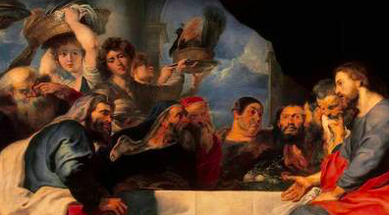 “For this reason many among you are weak and sick, and a number sleep” (1 Corinthians 11:30). Many, if not most, come to this verse (v. 30) in the 1 Corinthian 11 version of the Lord’s Supper written by Paul to the church at Corinth (11:23-32), and with little or no exegetical or contextual consideration, nor historical examination, take the “weak and sick” and “a number sleep” to mean the “unworthy” (v. 27) who had partaken of the Eucharist. In other words, they, then, had received some form of judgment (i.e., becoming weak, sick, and worse, die). More specifically, many also take these as non-Christians that have eaten the Lord’s Supper in an unworthy manner. This reading is also used as a rationale to discourage nonbelievers from partaking in the Lord’s Supper during a worship service each week. There is, however, a better, and more likely, reading of this important text. 1) The reference to “sleep” is a biblical euphuism for Christians that have died, not unbelievers—so, this verse is not a proof-text for non-believers who have “wrongly” partaken of the Eucharist. It is believers who have fallen asleep (died). And as far as I can tell, there is no exegetical reason the "weak," "sick," and the sleeping must be "the unworthy" of verse twenty-seven. Additionally, the term “weak” in Paul’s 1 Corinthian context also, usage-wise, points to believers. (See #3 for whom those who are the "weak," "sick," and asleep are within the Letter context and social location.) 2) The “meal” was a central element in the apostolic church gatherings and was so in the early church period for about 150 years after Pentecost (and continued in some form for another 150 years through about 300 AD). 3) There is a likely famine (or period of severe food scarcity; e.g., Suetonius, Claud. 18.2; Josephus, Ant. 3.320-21) that researchers have discovered or recognized had occurred at the time in the surrounding area, which would have made the meal issue a central concern (especially, if the poor in the congregation was not even finding food for themselves “at church,” let alone on the marketplace). 4) The occasion of the Letter itself is instructive, namely there is an elite-ism (which affirms the Roman social structure and association or social etiquette) that found its way to the meal or banquet component of the church gathering, which would have occurred just prior to the sharing of the cup of remembrance (of the Lord Jesus’ death) and the symposia or instruction time. 5) Verse 33 ought not be ignored in that it directly suggests that some were not allowed or welcomed or accepted or or re-classified to a different "spot" at the meal or simply shoved out of the meal (demonstrating the etiquette of the Empire and not the etiquette of the Kingdom of God). The primary instruction is, not to end the meal component of the gathering, but to wait for all to eat (v. 33) and thus reflect the social etiquette of the gospel. Plus, it is to those who eat before or at the expense of the poorer, less socially acceptable Christians that are told to eat at home (v. 34); still no instruction to end the meal/banquet as a form of the church's gathering for worship, instruction, and fellowship. Non-Christians are not in the purview for the correction and admonition here, but the Christian elites and status seekers. A more likely reading of verse 30 (For this reason many among you are weak and sick, and a number sleep) is that the “weak,” “sick,” and the sleeping (i.e., the dead) are, not non-Christians, but the poor and less acceptable Christians of the church at Corinth. There were those in the congregation who were sick and some had passed away (possibly) as a result of the famine, which was only made worse by the pushy elite Christians who stormed the meal ahead of or in spite of the poorer, less socially acceptable members of the body of Christ. If not as a result, then most certainly the reference to the weak, sick, and sleeping are a kingdom-reminder of why table fellowship was of such importance (the poor and marginal received a form a assistance, i.e., in this case food). The fellowship meal in the Corinthian form was not affirming the gospel. This is what Paul is addressing.
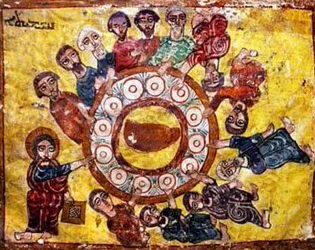 I am developing a paper (and chapter in a forthcoming book), "The Seditious Household: How Holy Kisses, Tables, and Other New Testament Practices Confronted Tyranny and Oppression." The paper will deal with how the early church--literally and more accurately, how early household-churches--leveraged their only power, namely their open (everyone welcome) house-church gatherings, against the powers of oppression and slavery. We, today, need to rethink our strategy or all we do is trade powers (theirs) for another power (ours), exchange one oppressor (them) for another (us). The big question for Jesus followers is how did he conquer and change what the powers had control over: through a Holy Kiss, a Table, Baptism(s), and Households. We need to return to that Holy Kiss, that Table, Baptism(s), and Households. ReRead the Acts and you'll get a hint. Jesus, the NT Jesus anyway, isn't simply a spiritual adviser; he is a king and a priest and a prophet, making him aversive--an political opponent to the powers in place in his day (which did not have any wall, fence, or divide between "church" (i.e., religion) and state. His life, the cross, and the resurrection confronted, disarmed, and overturned all the powers contrary to God's rule and reign. Recent research has acknowledged the “mission” and “witnessing” were not actually sited as the purpose or compulsion for the early church. Combine this with the clear fact that we have in Acts of the Apostles only the leadership—and actually only a few here and there—publically proclaiming the gospel. Inspired narrative doesn’t give us a picture of early church Christians “gossiping” the gospel, or offering a “Four Spiritual Laws” or even an Evangelism Explosion “If you were to die . . . what reason would you give for God to allow you into his heaven?” approach. What we do find is the gathering of unlikely participants—slaves, children, woman, along with the men, and the increasing of differing ethnic backgrounds—gathering on equal ground around a meal in a household, multiplying throughout the Roman Empire. Regarding slavery, my thinking was affirmed by a book review I read: despite our wish that Jesus and Paul had simply announced the evil of slavery (which they did not, at least in a clear way we’d appreciate and proof-text), we need to understand that they were after something higher, something more significant. (More important than ending slavery, condemning slavery! you might be tempted to judge too quickly.) Jesus and Paul upped the ante to a much more noble idea, the dignify of being a human being. Paul and Jesus (and Luke in Acts for that matter) had something much more ambitious (as the book being reviewed had stated) than advocating for slaves to be legally free (which would have been good for our comfort levels and political agendas, but actually not so much at that time for slaves). First and foremost, Paul and Jesus wanted the church to see slaves as human beings. They wanted to make them into human beings. This—slaves along with making children and women—into human beings (which they had always been, but you know what I mean)—is what changed everything, unhinged an empire, and its shadow (this approach and paradigm modeled by Jesus and the NT writers) has caste itself as the gospel moved demographically and geographically. This should be what the church is about: making others, especially the marginal, the oppressed, and disenfranchised into human beings. Albeit, the first mentioned of those being baptized in Acts is after the Spirit fell in chapter 2, but Luke’s narrative choices about baptisms is quite informative: Samaritans (“men and women”), an Ethiopian eunuch, the oppressor, Christian killer Saul, a military Gentile, a Gentile woman (and “her household”), a Gentile Jailor (and “his household”), and a outlier, Corinthian Jew with a Gentile name, Crispus (and “all of his household”) are the list Luke gives of those who were baptized. I didn’t include Simon, the magician, for his baptism was a fake, not real, and was used for his gain, not for entrance into the faith. Of course there are multitudes more, but when Luke has a chance to display and write about baptisms of believers in Messiah Jesus, these are the one’s he tells us about. The first time he mentions a believer being baptized after Pentecost it is Samaritan men and women; and the first time Luke tells us about an individual who believes and is baptized it is an foreign-gentile, eunuch, serving a pagan king. Not stop and think—what is the story, Luke’s narrative decisions, telling us about baptism and the spread of Christianity? "Though the Spirit continues to move, the assembly that is described in the New Testament with all the believers in the one fellowship of Jesus Christ and meeting in homes, house by house, is almost completely neglected. The true assembly has no hierarchy, nor man’s organization. Hierarchy is defined as levels of authorities to direct and control believers. All the various ministries should be for the building up of the assembly, but instead the opposite occurs. Whole churches are formed around various ministries. Not only are major denominational churches formed around powerful ministers such as Luther, Calvin and Wesley but also every church today is centered on the ministry of a particular teacher or preacher." - Henry Hon
The small, powerless, nothing for leverage young church grew; they believed they were actually citizens of the kingdom that Jesus preached and now they, too, were to announce it too . . . and it seems that they did so through gathering together--this unique community of poor, landowners, business women, slaves, children, ex-prostitutes, former cult and current military leaders, and women--gathered meals in households through Caesar's empire and, eventually, beyond. The gathered church that met “house to house,” in a family’s meal room was the platform for both proclamation of the gospel (in instruction and in reenacting the Lord’s Supper as part of a communal meal) and, as well, a seditious act against Caesar, the god’s of the empire, and the tyranny of oppressive forms of de-humanization. For the Cup was raised for a dead (but now alive) insurrectionist rather than for Caesar, the gods of Rome, or local family deities. The Broken and shared Bread was a declaration, not of Caesar’s provision or pf the gods, but of the dead (but now alive) insurrectionist’s provision for the forgiveness of sins—for all people. For, the leverage of the gospel proclaimed and enacted in the household-church gathering (the church’s only leverage) was who reclined (yes, actually reclined) at table for fellowship and eating and drinking. Breaking every known cultural and social etiquette and acceptability of the day, of the empire. The church’s only leverage for its seditious church gathering around the meal and the Cup and the Broken Bread was a gathering of a community of poor, landowners, business women, slaves, children, ex-prostitutes, former cult and current military leaders, and women. The form of the household church gathered (literally reclining) around a table and eating and drinking was a true and faithful representation (literally an outcome) of the gospel of Jesus, the Messiah. Moving the gathered believers away from homes and into addressed, concrete buildings and removing the meal-feast-banquet from the center of the gathered who came for worship, fellowship, and instruction were the first moves for the church away from caring for the poor upfront and personal; and, the first step in refusing to believe Jesus' words, "the poor, you will always have among you."
|
AuthorChip M. Anderson, advocate for biblical social action; pastor of an urban church plant in the Hill neighborhood of New Haven, CT; husband, father, author, former Greek & NT professor; and, 19 years involved with social action. Archives
February 2024
Categories
All
|
Pages |
More Pages |
|

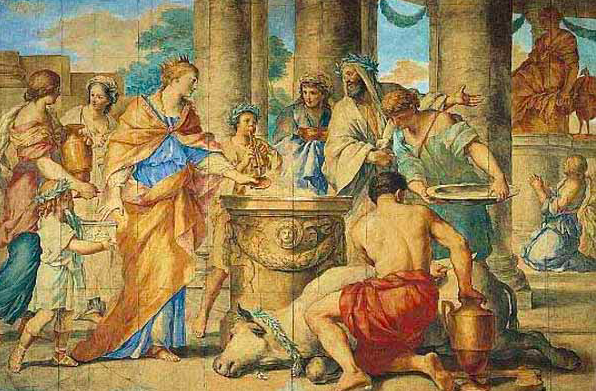
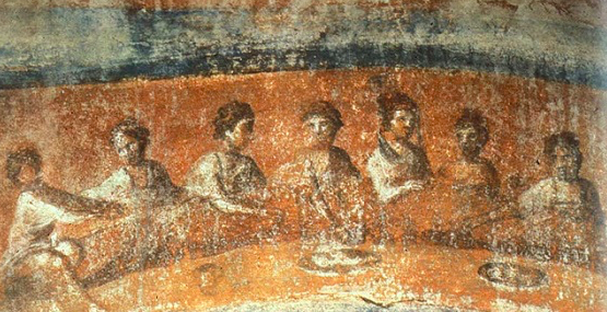

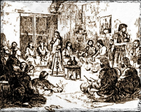
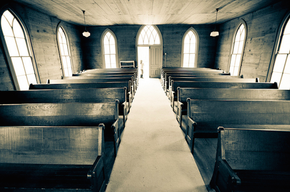
 RSS Feed
RSS Feed